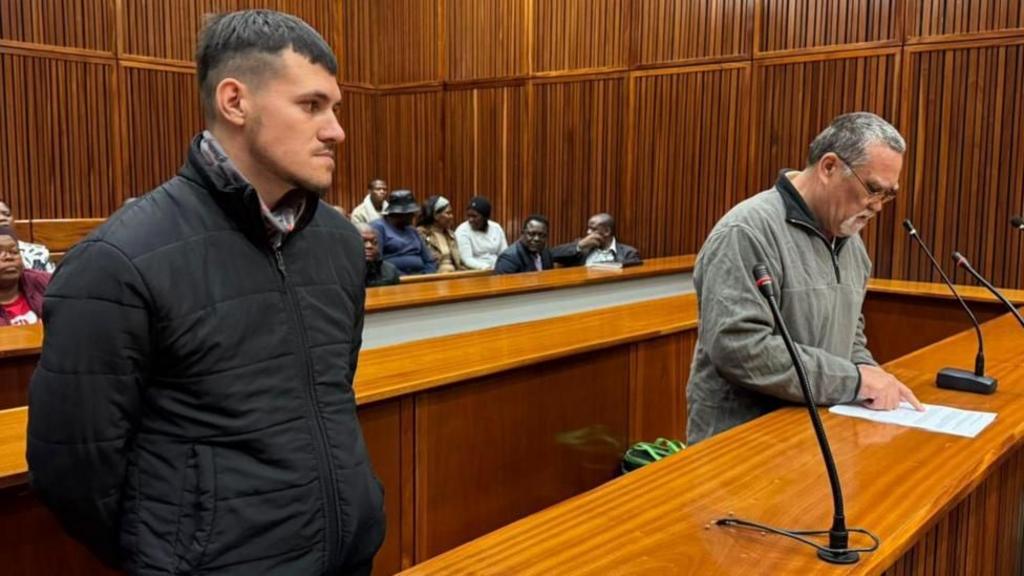In a disturbing testimony, a South African farm worker told a court that his employer forced him to feed the bodies of two Black women to pigs in an attempt to conceal evidence after they were fatally shot.
Adrian De Wet, 21, testified that he was instructed to dispose of the bodies in a pig enclosure, relaying the instruction that “when pigs are hungry enough, they’ll eat anything.”
De Wet admitted to participating in the shooting of the two women alongside his employer, Zachariah Johannes Olivier, the farm owner, who then allegedly ordered him to help dispose of the remains.
Olivier, along with William Musora, face murder charges in connection to the deaths of Maria Makgato, 45, and Lucia Ndlovu, 34. The women were allegedly killed while searching for food on a farm near Polokwane, located in South Africa’s northern Limpopo province, last year.
Mr. De Wet, who was a farm supervisor, was initially accused of murder but the charges were dropped after he agreed to testify for the prosecution. He claimed he acted under duress when he was forced to dispose of the bodies in the pig enclosure.
During his testimony at the Polokwane High Court on Thursday, De Wet stated that he and Olivier, 60, armed themselves with hunting rifles and waited for trespassers on the night of August 17, 2024.
He recounted that after a 30-minute wait, they heard voices approaching.
They then opened fire, heard a scream, and upon investigating, found a person lying face down.
After leaving the scene and returning the next morning, they discovered the body of a woman.
De Wet testified that Olivier instructed him to help throw the body into an enclosure housing eight to ten adult pigs.
The following day, a second body was found approximately 25 meters from the location of the first.
Olivier, De Wet, and Musora, 50, are accused of then disposing of the second body in the same pigsty.
On the following Tuesday, they returned to the pigsty and discovered that the pigs had consumed significant portions of the women’s flesh.
Photographic evidence presented in court depicted missing buttocks, face, thighs, and shoulders.
State prosecutor Advocate George Sekhukhune questioned De Wet about the purpose of placing the bodies in the pigsty, to which he responded, “We were disposing of the evidence because when pigs are hungry enough, they’ll eat anything.”
De Wet further testified that Olivier used an angle grinder to dismantle the hunting rifles and burned the wooden parts. The disassembled weapons and spent cartridges were then disposed of in a borehole.
The son of victim Ms. Makgato reportedly wept during the court proceedings, while Olivier was observed wiping away tears as De Wet presented his testimony.
The case has ignited outrage across South Africa, intensifying racial tensions that persist between Black and white communities.
These tensions are particularly acute in rural areas, despite the dismantling of the apartheid system 30 years ago.
The majority of private farmland remains in the hands of the white minority, while most farmworkers are Black and receive low wages, contributing to resentment within the Black population. Simultaneously, many white farmers express concerns about high crime rates.
Cross-examination by the defense lawyers representing Olivier and Musora is scheduled to resume next Wednesday.
President Andry Rajoelina had promised to resign if he didn’t fix the country’s problems within a year.
More than 300 petrol tankers make it to Bamako under military escort a week after pumps run dry.
A group of Sudanese medics says the latest attack on el-Fasher is a war crime.
Ethiopia has written to the UN, accusing Eritrea of “funding, mobilizing and directing armed groups” on its soil.
The president says it will speed up integration into East Africa, seen as crucial for boosting trade.

